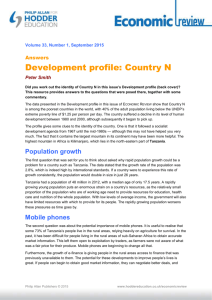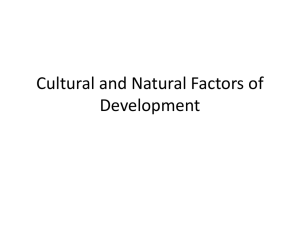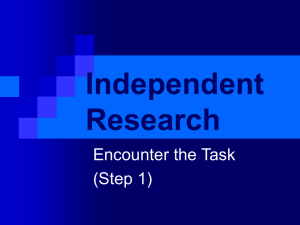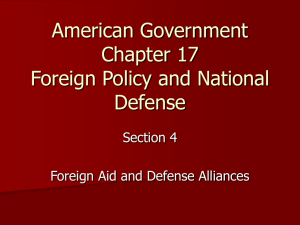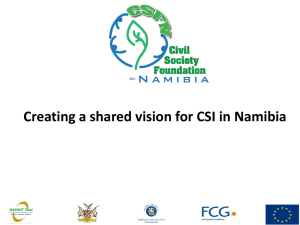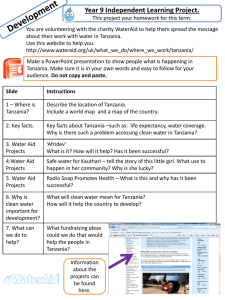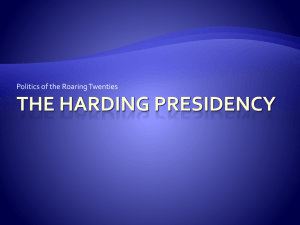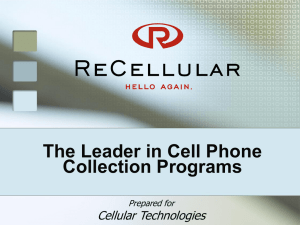Presentation - Better Evaluation
advertisement
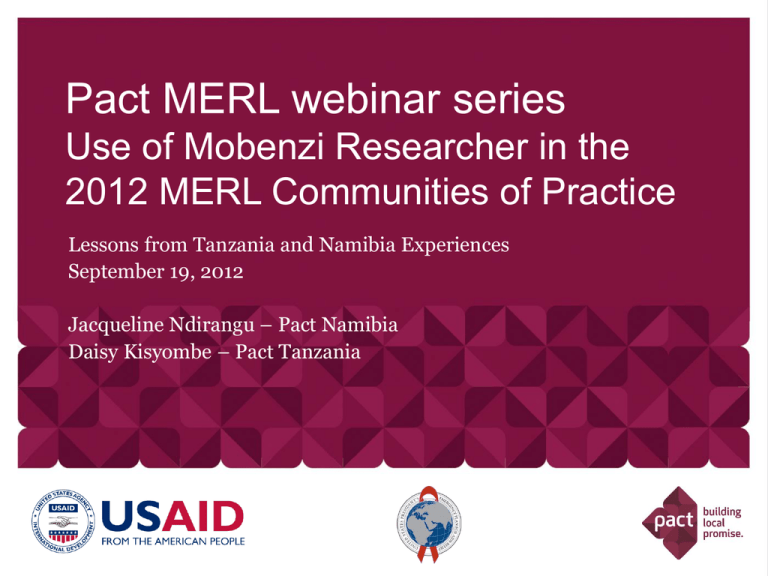
Pact MERL webinar series Use of Mobenzi Researcher in the 2012 MERL Communities of Practice Lessons from Tanzania and Namibia Experiences September 19, 2012 Jacqueline Ndirangu – Pact Namibia Daisy Kisyombe – Pact Tanzania What is Mobenzi Researcher? • A technology that allows you to collect data using a mobile phone. • Data is uploaded and transmitted to a central server using internet connection. • Data from the server can easily be exported to excel and SPSS for analysis Process of setting up Mobenzi Researcher? • Procured handsets that are compatible with the Mobenzi Researcher technology and set them up with the Mobenzi Researcher software • Developed the questionnaire as usual (in MS Word) and emailed the same to Mobenzi support personnel to set up for use on the handsets • Surveys were set up online with technical support from the Mobenzi team • Mobenzi support team can help to register each of the mobile phones and issued log in and password information for individuals authorized to view/work with the data online. • In case you use local language; Mobenzi team sends English questionnaires in Excel for translation and then set up online Survey tool design Survey tool design…. Survey on the Phone Data collection with Mobenzi Researcher • For optimum results; a central controller is needed with reliable internet access to monitor data entry and alert on issues emerging as data comes in • Once questionnaire is downloaded on the phone; data can be collected offline and stored on the phone till when phone is on network coverage area • Data stored on the phone automatically uploads into Mobenzi once network is recovered • Be sure to give each field worker a phone that is specifically assigned to him/her (no mixing up) Mobenzi online dashboard: Analytical Overview Mobenzi online : Grid view Advantages and disadvantages of Mobenzi vs. paper based surveys ADVANTAGES DISADVANTAGES Time saving (1258 households interviewed in Tanzania in 4 days) cutting off massively on time for data entry. Not suitable for qualitative data collection Affordable costs ( USD 2600 for platform usage for Tanzania baseline including 5 surveys; USD 575 for Mobenzi survey set up for Namibia) Allows instant addressing of data errors while team is still in the field May be expensive initially (if the costs of the phones cannot be spread out to other program activities) Allows technologically advanced data collection e.g. digital photo, GPS coordinates for maps alongside your data Data can be synchronized to other databases if needed May create negative perceptions for communities that are not aware of technology Data quality and security assurance • Built in quality checks ensuring no incomplete submissions • Data in server can only be viewed/edited by Pact authorized personnel • All edits are recorded including person who did the edit and when. Original data submission is not lost in case you need to reverse the action • Data entered via phone once submitted cannot be viewed from the phone • Data in server is encrypted and password protected What worked well? • Easy to set up the phones with the Mobenzi Researcher software • Assigning of phones and codes to each of the data collectors • Easy to update the survey when changes were made after the pilot test • Data collection was standardized and systematic for all data collectors • Data export from Mobenzi server in Excel to SPSS for analysis What did not work so well? • Limited time available to train data collectors and allow time to familiarize with using the technology. • Handsets were not GPS enabled • Collection of the ‘Other’ data. Typing of text was time taking, hence resorted to recording and transcribing responses to ‘Other’ questions. • Battery life for some type of phone not able to sustain long hours of data entry Tanzania results overview OUTCOME RESULT AREA Child protection FINDINGS Education Psychological well being Transition to next level of education -18.7% - 42.8% Hope for future - 27.7% - 38.4% Stigma feelings - 9.9% - 11.2% Sleeping hungry >10 times in 4 weeks – 11.4% - 29.5% Household food security Child labour (working and not attending school) - 9% - 18% Health Under 5 fully immunized 50.8% Chronic illness 39.4% - 47.9% HIV+ caregivers 12.7% - 28.8% Household economy 75% subsistence farmers 5.2% (m) and 5.7% (f) caregivers have no income at all Vulnerability status Female headed households - 58.8% 44% Orphans Namibia results overview Evaluation Issue Key findings Capacity Development More years of support = lower usefulness rating, but Effectiveness higher OPI scores Pact and partners see usefulness differently over the duration of support Graduation to Direct Funding Graduation prerequisites: Strategic planning, governance, finance, admin, technical capacity and M&E support Key post-graduation needs: technical and resource mobilization support Lessons Learned for Sustainability of capacity building depends on whose Capacity Development decision it was to engage in capacity development Organizations On average partners tended to score lower in resource mobilization on OPI scoring Way Forward • Future evaluations e.g. upcoming Tanzania baseline in program expansion area/ mid term evaluation • Global indicators data entry • WORTH data collection Thank you!
